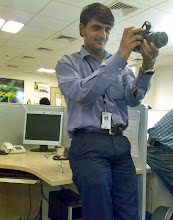Stories and storytelling don't just have the power of creating an unseen, illusionary world; true power is giving the audience the feeling of belonging-ness in that dream, blurring the boundaries of dreams and reality. Entertainment is the by product, when indulgence is sought and achieved. Great stories have the power to defy stereotypes, science and logic. They amaze us with myriad, larger than life characters, gripping events, twists and turns and then with climaxes. Then, there are stories that don't have monsters, giants, kings and wars. With these we don't travel to a new world, but see our own surroundings with new eyes. Such stories don't make us ask - how the 'creator' thought about it, they make us amaze - why didn't I think of this. These stories happen at real places, and real times; and become timeless, freezing that time, to be relived forever and ever.
Exposure to wide range of cinematic art has made me a bitter critic of Indian cinema, or rather the populist Bollywood cinema. I watch Academy awards and see so many beautiful stories being told and then I return to Hindi movies to feel sorry about it. Times are changing though. Sandwiched among 100cr bumper (bummer) hits, we do get a nice story every now and then; more like a consolation prize. Then I think of Gurudutt era, how a single artist can turn the direction of how people perceive art. Sadly, the golden era didn't last long.
From then till now, finding stories have been like deep sea diving to find rare jewels. One such piece which was way ahead of its times is Dev sahab's Guide. A story of love and passion, dreams and realities, wanderings and friendship, faith and scepticism, life and death. And so many other colors. I guess I'd seen this wonderful movie years ago, but its simplicity was too intricate to evoke response from a kid. Years (decades?) later, when I watched this movie again, this time carrying a wealth (?) of life experiences, I was spell-bound. A story that doesn't have villains and super heroes, that what most of our lives are; right? Joys as well as boredom of mundane routines, conflicts of ideals and dilemmas of choices.
I'm not a fan of songs and dance numbers in Hindi movies, somehow, I didn't find a single performance or dance sequence out of place. Rather each song or dance number was so beautifully placed like the story would have simply stopped without them. And then, Barman Da's voice, aaha, why would we need a narrator to carry us through scenes that coalesce or condescend time. There are scenes that tell us so much about a character in few seconds. When Nalini/Rosy asks - "Kya yahan paas koi sapelon ki basti hai, jahan ek saperan naag-nartya karti hai (Crude translation - Is there a village nearby, where a traditional snake-dancer performs)", you feel the anticipation, urge, devotion and suppressed dreams. When Raju keeps asking Marko something or other to remind of his wife, and he is so lost in his bliss of discovery; we see a researcher's, wanderer's joy. When an old-cultured uncle scolds Raju for bringing disrepute to family name and then years later melts with pride seeing his apology (?) saying "aakhir khoon to hamara hi hai (After all he is our own blood)", you see generations (old and present) of rural India epitomized in a single man... And so many others.
Climax is not just a gripping end to and engaging tale, but an amazing cinematic experience. There is enough room for questioning the events and scepticism, but then thats what real life is - chances and more chances. Allusions and inferences to faith seem so well intertwined, for a while I wished to be a believer and craved for prayer and mercy. Ah the power of story-telling. I didn't just enjoy the movie, I lived it and will relive it for long. It was a love story, a tragic story, a humane story, a beautiful story.
(I may have to edit the piece for spelling and grammatical phrases; owing the real life compulsions of following the 'routine', now is the time to surrender to dreams, Good Night!)


0 comments:
Post a Comment